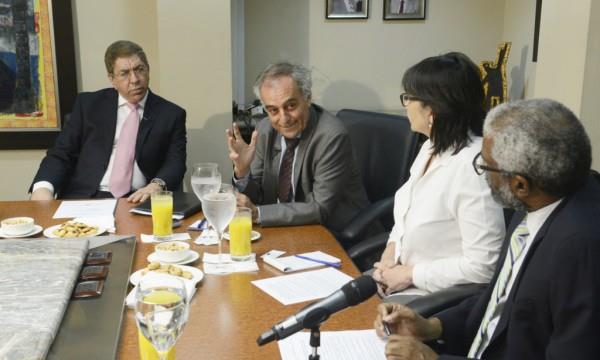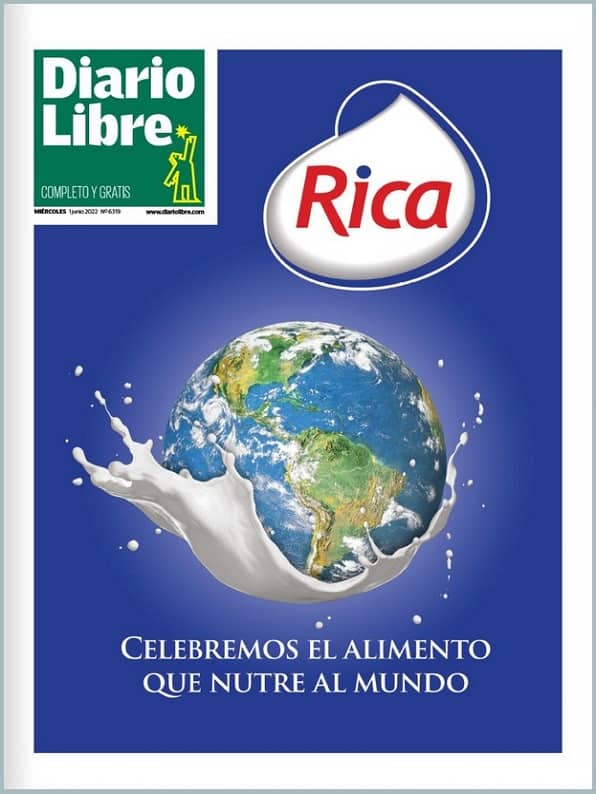European Union Ambassador: "Haiti is not just problems, it is also an opportunity"
DR and Haiti need agreements on extradition and investments

SANTO DOMINGO. "We have to begin to spread this message that Haiti is not only problems, it is also an opportunity for tourism, for Dominican businessmen, and at the same time say in Haiti, that the one country in the world that is most interested in Haiti getting better, and that there is a prosperous and stable Haiti is the Dominican Republic."
This statement comes from the voice of the ambassador from the European Union Delegation in the Dominican Republic, the Spaniard, Alberto Navarro, who during his participation in the Dialogo Libre segment, sponsored by the Diario Libre, also referred to the need that there exist extradition and investment protection agreements between this country and Haiti.
The diplomat said that he felt that it was not necessary to look at immigration as a problem, but at riches. "The countries of the future are countries of mixtures," he said, and gave the examples of the United States, Brazil and Spain. It is because of this that he understands that once they manage to normalize the immigration status of many Haitian immigrants and their descendants in the country, there will be a larger collection by Social Security.
"If they can normalize a lot of persons that are working and do not pay into Social Security, and that are definitely are not persons because they lack the basic rights, such as the right to an identity and to a nationality, I believe that it would be good for the economy of a country, because it would permit an improvement in the collections by Social Security and integrate these people into the economy," he said.
He pointed out that the European Union is very interested in the documentation of the Haitians in this country, and he stressed the work that has been done by the Organization of American States (OAS) in this direction.
The OAS has documented nearly six million Haitians, and has digitalized nearly 18 million documents, in the majority birth certificates, and also marriage and divorce certificates, and they are taking care of them, but they have only documented persons of voting age, which is to say that when they did this work in Haiti, some four million Haitians remained without documentation," he said.
He indicated that the official numbers that say that there are 458,000 migrant persons in the Dominican Republic, of which 209,000 are Haitians without any documentation, and this serves as the basis for establishing the disposition of the European Union to help, together with other donors, such as the United States or Canada, "to establish order where there was no order."
Bi-national talks
Navarro said that the European Union hopes that the high level bi-national talks between the Dominican Republic and Haiti continue to produce results. His delegation takes part as an observer. The third meeting was set for 8 April, but it was postponed because of the recent changes in the cabinet of the government of Haiti.
"I was at the last meeting which took place in Jimani, and I saw how the agreements between the Police of the two sides were signed, between the Customs directors. All this in the end is only for the benefit of the citizens, which is what I believe should be uppermost in the relations between the two governments," he said. This interest in supporting the Dominican Republic in the relations with its neighbor is also manifested in the financing of bi-national projects, such as the construction of the market in Dajabon, which is scheduled to be expanded.
We are going to build the market of Juana Mendez in order that it function as one market; we are financing the improvements on the rural roads, the environmental cooperation, projects such as the biological corridor which is not just Haiti and the Dominican Republic, but also Cuba, and the promotion of commerce between these two countries," Navarro said.
Treaties are needed
Because of the territorial proximity and the historical bi-national relations that it appears counter-productive to the Ambassador of the European Union that between the Dominican Republic and Haiti there are not extradition agreements or protection of investments. With respect to the investments, he said that he is surprised that there is not treaty covering this when in the Dominican Republic "there are important Haitian investments, such as the Texaco group, like many others, that at times are unknown to the citizens themselves."
Support for bi-lateral commercial agreements
The opportunities that Alberto Navarro, the ambassador from the European Union in the Dominican Republic sees in Haiti for the Dominican businessman, have him supporting the two countries knowing each other better, distrusting less, talking more and promoting exchanges.
"We will try to ask the ministers of Commerce why there is not agreement to protect investments, why the two customs don't work closer together, why there is not electricity interconnection which does not exist between the two sides, because in the end this will be good for everyone," said Navarro as he answered questions on Dialogo Libre in reference to what the European Union thinks about a Free Trade Treaty between the Dominican Republic and Haiti.
For some years, different sectors of the country have proposed the creation of a FTA between both countries. On 16 August 2012, in his inaugural speech at the National Assembly, President Danilo Medina announced that his administration would work on a proposal for the signing of such a treaty.
"The harmonious relationship with our neighboring country Haiti deserves special attention for us (EU). We will work with them immediately on the beginning of a proposal for the signing of a free trade agreement (FTA)," Medina said at the National Assembly.
Ambassador Navarro said that the position of the countries that share frontiers should be the first in reaching an understanding. "Foreign Policy starts with the neighbors," he said. And he added: "You have to know that also many times the neighbor is blamed for all of the evils or faults that one has."
Sentence 168-13
The European Union ambassador said that he was interested, once the Naturalization Law is approved, is resolving the problem generated by sentence 168-13 from the Constitutional Tribunal which de-nationalizes an important number of descendants of Haitian immigrants in the country.
He recalled that he met in October with member states of the European Union, and he expressed his worry over the impact that the decision of the high court would have on persons that considered themselves to be true Dominicans.


 Mariela Mejía
Mariela Mejía
 Mariela Mejía
Mariela Mejía